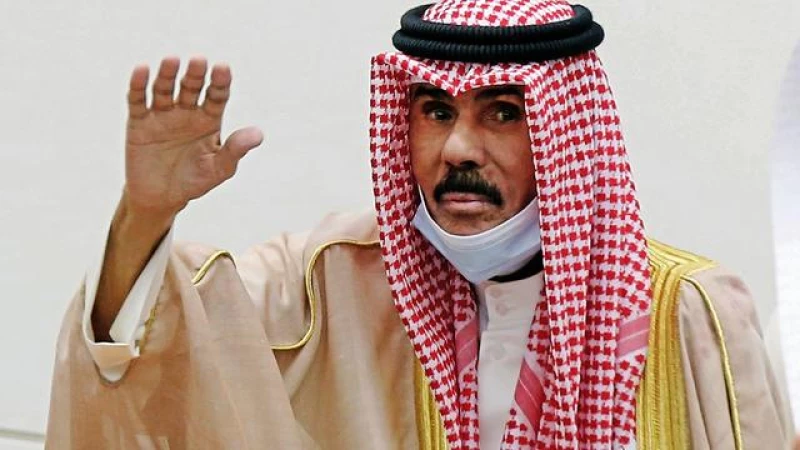Sheikh Nawaf Al-Ahmed Al-Jaber Al-Sabah, Kuwait's ruling emir, passed away on Saturday at the age of 86. During his three-year reign, he focused on resolving internal political disputes in the oil-rich nation.
Kuwait state television interrupted regular programming to announce the news, accompanied by Quranic verses.
Sheikh Mohammed Abdullah Al Sabah, the minister of his emiri court, delivered a statement expressing the sorrow of the Kuwaiti people, Arab and Islamic nations, and the friendly peoples of the world.
The cause of death has not been disclosed by authorities.
President Biden expressed his sadness over the death, describing Sheikh Nawaf as a valued partner and true friend of the United States. Biden emphasized their shared vision for peace and stability in the Middle East and pledged to strengthen the longstanding ties between the two nations.
Kuwait's New Emir Becomes One of the Last Octogenarian Leaders in the Gulf
Kuwait's deputy ruler and his half-brother, Sheikh Meshal Al Ahmad Al Jaber, now 83, had been the world's oldest crown prince. The state-run KUNA news agency said Sheikh Meshal, a longtime leader in the country's security services, had been named emir Saturday afternoon and now is one of the Gulf Arab countries' last octogenarian leaders.
The health of Kuwait's leaders remains a sensitive matter in the Middle Eastern nation bordering Iraq and Saudi Arabia, which has seen internal power struggles behind palace doors.
Those from Sheikh Nawaf's lifetime, born before oil fully transformed Kuwait from a trading hub into a petrostate, have been fading away with age. That, as well as other Gulf Arab nations putting younger and more assertive rulers in power, has increasingly put more pressure on the Al Sabah to pass power onto the next generation.
In neighboring Saudi Arabia, King Salman, 87, is widely believed to have placed day-to-day rule of his nation in the hands of his 38-year-old son, Crown Prince Mohammed bin Salman.
Sheikh Nawaf was sworn in as emir in 2020 during the coronavirus pandemic, following the death of his predecessor, the late Sheikh Sabah Al Ahmad Al Sabah. The breadth and depth of emotion over the loss of Sheikh Sabah, known for his diplomacy and peacemaking, was felt across the region.
Sheikh Nawaf previously served as Kuwait's interior and defense minister. His political fortunes were never certain despite being part of the ruling Al Sabah family. As defense minister, Sheikh Nawaf oversaw the rapid collapse of his forces during Iraqi dictator Saddam Hussein's invasion of his country in August 1990. He faced widespread criticism for his decisions during the war.
A U.S.-led, multinational force later expelled the Iraqis from Kuwait in Operation Desert Storm. The Al Sabah never published the findings of its investigations into the government's actions around the invasion.
"Our main target is the liberation. After we return, we will repair our own house," Sheikh Nawaf said in 1991. "You have to reform yourself and correct any previous mistakes."
Sheikh Nawaf's Tenure as Emir of Kuwait
Sheikh Nawaf faced a demotion and then didn't hold a cabinet-level position for about a decade afterward, serving as a deputy chief of the country's National Guard. Even on his return, analysts viewed him as not particularly active in government, though his low-key approach later appealed to some Kuwaitis who ultimately moved on from his wartime performance.
Sheikh Nawaf was largely an uncontroversial choice for emir, though his advancing age led analysts to suggest his tenure would be short. It was — he had the third-shortest tenure of any emir since the Al Sabah ruled Kuwait beginning in 1752.
During his term, he had been focused on domestic issues as the nation struggled through political disputes — including the overhaul of Kuwait's welfare system — which prevented the sheikhdom from taking on debt. That's left it with little in its coffers to pay bloated public sector salaries, despite generating immense wealth from its oil reserves.
In 2021, Sheikh Nawaf issued a long-awaited amnesty decree, pardoning and reducing the sentences of nearly three dozen Kuwaiti dissidents in a move aimed at defusing a major government standoff. He issued another just before his illness, aiming to resolve that political impasse that also saw Kuwait hold three separate parliamentary elections under his rule.
"He earned his title — he has a nickname here, they call him 'the emir of pardons,'" said Bader al-Saif, an assistant professor of history at Kuwait University. "No one in modern Kuwaiti history has gone this far to reach out to the other side, to open up."
Kuwait: A Nation with a Free Parliament and Vast Oil Reserves
Kuwait, a nation with a population of about 4.2 million people, is known for having the Gulf's freest parliament. Unlike many other countries in the region, Kuwait allows for dissent and encourages political debate.

In addition to its political openness, Kuwait is also home to the world's sixth-largest known oil reserves. These vast reserves have made Kuwait a significant player in the global oil industry.
Since the 1991 Gulf War, Kuwait has been a staunch ally of the United States. The country hosts around 13,500 American troops and serves as the forward headquarters of the U.S. Army in the Middle East.







